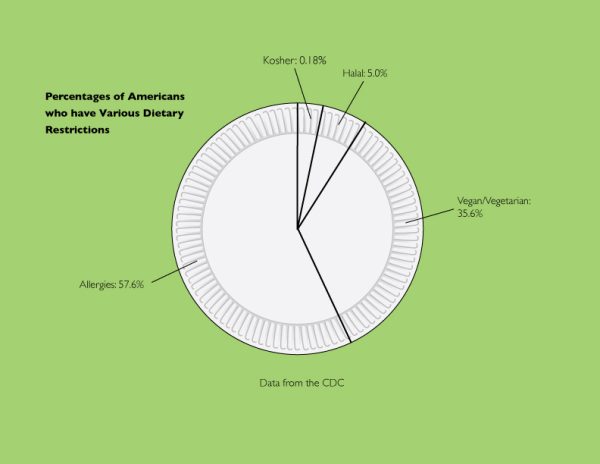To ensure that students with dietary restrictions can buy school lunch, Inglemoor provides students with online forms to request dietary accommodations for milk substitution or nut-free or other food. However, other dietary restrictions require a different form. Students work out their individual cases with lunch staff and the school nurse.
“At the beginning of the school year — all the students that have allergies — we put it on their account. So when we’re ringing up, it shows that [they] are allergic to pineapple or something like that,” kitchen manager Carla Powell (she/her) said.
Labels for specific allergens are present in every “Grab and Go” section of the cafeteria and in online interactive menus. Students can use the different symbols to look for their dietary restrictions. For example, the small milk symbol serves as a warning to all lactose intolerant students.

However, students like junior Akhila Lankalapalli (she/her), who doesn’t eat beef or pork because of her Hindu faith, may need to change their lunch choices daily.
“I find that I can’t always have school lunch because the majority of them are always with beef or pork,” Lankalapalli said.
Lankalapalli said that her fear of getting close to eating beef and pork is especially strong in America, where beef and pork are very popular foods. In contrast, in India, where her family is originally from, there is barely any beef or pork.
“Being constantly aware of what meat is around me and basing my food choices off of that is really important,” Lankalapalli said. “You always have to be like ‘Can I substitute this with something else?’”
Lankalapalli’s dietary restrictions are a large part of her culture; however, she said it can be hard to explain her dietary restrictions to others. Lankalapalli said that this struggle is common in casual situations, such as when she is invited for a meal.
“It’s like explaining to people why can’t I just take the meat off of things,” Lankalapalli said. “I always feel bad for making the people around me having to cater to my own needs. But since my religion is a really big part of who I am, I feel like it’s my responsibility to take that action.”
While Inglemoor does not specifically accommodate religious dietary restrictions, such as kosher options, it does provide options that overlap with vegetarian alternatives. Lankalapalli said that compared to her elementary school, Inglemoor has a lot more options.
“[In elementary] it was one day per week, I’d have a non-beef or non-pork option. But for Inglemoor, I see there’s salad options or other options I can go for instead of something incorporating beef or pork,” Lankalapalli said.
Junior Blaze Antrobus (he/they) has experienced a range of dietary restriction policies at different schools. Antrobus said he’s especially vigilant about checking the ingredients in school lunches after he had an allergic reaction in elementary school.
“Luckily, I didn’t have bad reactions at the time, but my reactions got worse and worse over time,” Antrobus said.
Antrobus usually determines what to eat in the cafeteria by checking the list of ingredients and confirming with their friends beforehand. Since Antrobus can experience severe allergic reactions, food that has been cross-contaminated or processed with his allergens can be life-threatening. Students with dietary restrictions also encounter food they can’t eat in other school settings such as club-hosted events, sports banquets and class parties. Senior Lauren Dellinger (they/them) is involved in multiple extracurriculars, and they often worry if they will have options for food at events.
“It’s caused me a lot of anxiety just never knowing if people will have food for me, especially since I do both the choir program and the drama program, and I do swim. So I do a lot of programs at our school that cause me to skip meals or like having nothing to eat through that program,” Dellinger said.
English teacher Marita White (she/her) is gluten-free because of celiac disease, a digestive problem that prevents the body from absorbing nutrients from food. When she started working at Inglemoor, PTSA and staff lunches didn’t have gluten free or vegetarian options. After White and other teachers with dietary restrictions alerted the district of this issue, the district added vegetarian/vegan, dairy-free and gluten-free options to staff breakfasts and lunches.
“The district was really kind and responsive in that way. And now there’s always something for us, which is fabulous. There are so many different options with so many overlapping needs or overlapping things to avoid,” White said.
Adjusting to dietary restrictions can be challenging, especially when the need to check every meal for certain foods is new. A year and a half ago, Dellinger was diagnosed with two autoimmune diseases that have changed the way they navigate meals.
“It’s just always something to be conscious of when someone is newly diagnosed or even if they’ve been diagnosed for a very long time; it impacts physical and mental health. So be careful, be sensitive to everyone else,” Dillenger said.












